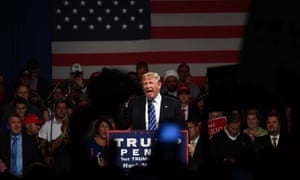
Donald Trump’s rally in Novi, Michigan, on Friday had a guest that caught many observers by surprise. Hovering behind Trump’s head in the fourth row, was a man in a white turban and the traditional dress of a Shia Muslim cleric.
The man was later identified as Lebanese sheikh Mohamed El-Hajj Hassan, who has since received a barrage of criticism for attending the rally given Trump’s inflammatory language toward Muslims, including his call for all Muslims to be banned from entering the country.
Before the rally in Novi, Trump met with Hassan and members of the American MidEast Coalition for Trump – a group working to build support for Trump in Middle Eastern communities – at an event organized by his foreign policy adviser and Fox News pundit Walid Phares.
Hassan was previously a part of Hezbollah, the Shia militant and political group that has been listed as a foreign terrorist organization by the US state department since 1997. He broke off from the group shortly after the 2005 assassination of former prime minister Rafik Hariri, and formed the Free Shia Movement, a splinter group that has gained little to no traction in Lebanon since.
Hassan has since maintained his position as a vocal opponent of Hezbollah; even appearing on a TV show last year referring to the group as hooligans.
His attendance at the Trump rally last week drew the ire of a range of onlookers online.
“Every commentator (who isn’t a member of a political party) that I’ve seen comment on this was just confused,” said Joey Ayoub, Lebanese blogger at Hummus For Thought and MENA editor at Global Voices Online. Ayoub added that Hassan’s anti-Hezbollah stance does not gel with Trump’s tacit support for Vladimir Putin, as the Russian president supports Hezbollah in Syria.
However, Hassan said Trump told him he likes Muslims and he has no problem with them, according to the Detroit Free Press.
Michigan is home to the largest Arab American population in the country. Trump probably hoped that Hassan and the dozen other religious leaders he met with at the American Mideast Coalition for Trump event, would help mend his image among Arab Americans.
“Trump obviously benefits from the optics of having a visibly Muslim Arab at his rally,” said Dr HA Hellyer, senior non-resident Fellow at the Atlantic Council. But he added, “it will mean harsh questions for Hassan from the larger Arab and Muslim communities in the United States, and probably in Lebanon too.”
The meeting with Trump was orchestrated by Phares, a controversial figure in Trump’s campaign. The news of his appointment as foreign policy adviser to Trump in March 2015 was met with a wave of backlash.
Phares is reported to have been a member of the Phalangist militia, a Christian Maronite force, during Lebanon’s brutal sectarian civil war that spanned 1975-1990. According to a 2011 Mother Jones investigation, Phares was in charge of the ideological training of militia troops and even advocated for the creation of a Christian enclave within Lebanon, a hardline position in the multi-confessional state. There is no indication that Phares personally carried out any acts of violence or war crimes.
The 15-year-long Lebanese conflict was brutal, with atrocities committed on all sides. The Phalangist militia itself, which was allied with the occupying Israeli army, was responsible for one of the war’s lowest points: the 1982 massacre of hundreds of civilians at the Sabra and Shatila Palestinian refugee camp in Beirut.
Phares ultimately fled Lebanon during the civil war and relocated to the US where he then became an academic. Over the next two decades, Phares published several books and espoused a hardline approach to Islam and the Middle East.
“He began to endear himself to neocons after 9/11, with his books and studies about radical Islam,” said Mohamad Bazzi, a New York University professor in journalism.
According to Bazzi, he lumped all Islamist movements together – non-violent and violent – and heightened fears and suspicions around Islam. Phares became a regular “expert” guest on NBC and later Fox News, even though several terrorism experts, such as as Martha Crenshaw, and Andrew Exum, have discredited his work.
In 2011, the former Republican presidential nominee Mitt Romney appointed him to his campaign as a foreign policy adviser, the same role he now fulfills for Trump.
The appointment was met with backlash from the Council of American-Islamic Relations and a variety of Islamic scholars who said that Phares had no credibility.
“It would be akin to turning to [former KKK member] David Duke to get advice on race relations,” Omid Safi, currently director of Duke University’s Islamic Studies Center, told the Daily Beast at the time.
No comments:
Post a Comment